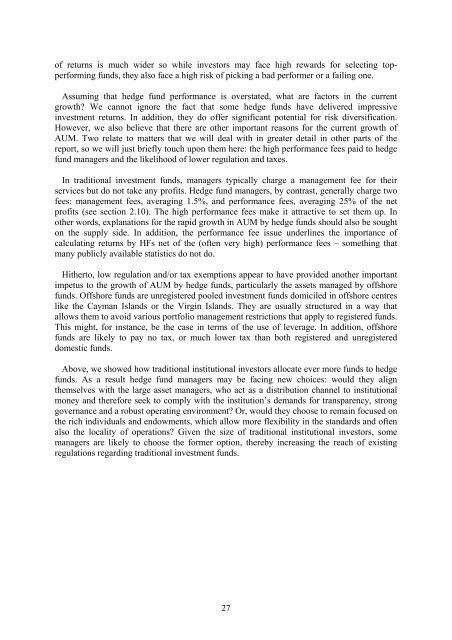Executive summary - Udo Bullmann
Executive summary - Udo Bullmann
Executive summary - Udo Bullmann
- No tags were found...
Create successful ePaper yourself
Turn your PDF publications into a flip-book with our unique Google optimized e-Paper software.
of returns is much wider so while investors may face high rewards for selecting topperformingfunds, they also face a high risk of picking a bad performer or a failing one.Assuming that hedge fund performance is overstated, what are factors in the currentgrowth? We cannot ignore the fact that some hedge funds have delivered impressiveinvestment returns. In addition, they do offer significant potential for risk diversification.However, we also believe that there are other important reasons for the current growth ofAUM. Two relate to matters that we will deal with in greater detail in other parts of thereport, so we will just briefly touch upon them here: the high performance fees paid to hedgefund managers and the likelihood of lower regulation and taxes.In traditional investment funds, managers typically charge a management fee for theirservices but do not take any profits. Hedge fund managers, by contrast, generally charge twofees: management fees, averaging 1.5%, and performance fees, averaging 25% of the netprofits (see section 2.10). The high performance fees make it attractive to set them up. Inother words, explanations for the rapid growth in AUM by hedge funds should also be soughton the supply side. In addition, the performance fee issue underlines the importance ofcalculating returns by HFs net of the (often very high) performance fees – something thatmany publicly available statistics do not do.Hitherto, low regulation and/or tax exemptions appear to have provided another importantimpetus to the growth of AUM by hedge funds, particularly the assets managed by offshorefunds. Offshore funds are unregistered pooled investment funds domiciled in offshore centreslike the Cayman Islands or the Virgin Islands. They are usually structured in a way thatallows them to avoid various portfolio management restrictions that apply to registered funds.This might, for instance, be the case in terms of the use of leverage. In addition, offshorefunds are likely to pay no tax, or much lower tax than both registered and unregistereddomestic funds.Above, we showed how traditional institutional investors allocate ever more funds to hedgefunds. As a result hedge fund managers may be facing new choices: would they alignthemselves with the large asset managers, who act as a distribution channel to institutionalmoney and therefore seek to comply with the institution’s demands for transparency, stronggovernance and a robust operating environment? Or, would they choose to remain focused onthe rich individuals and endowments, which allow more flexibility in the standards and oftenalso the locality of operations? Given the size of traditional institutional investors, somemanagers are likely to choose the former option, thereby increasing the reach of existingregulations regarding traditional investment funds.27





